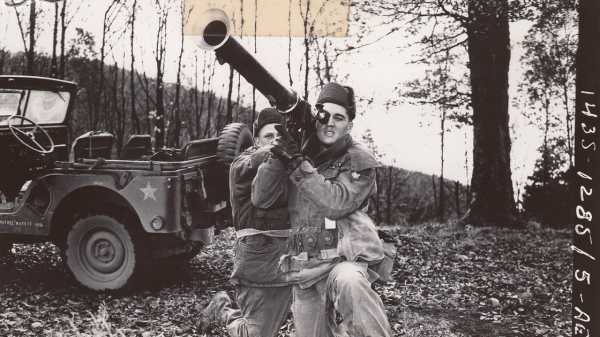
The first shot of Eugene Jarecki’s documentary “The King” is a ribbon of road in remote country, the camera low near the roadside and its shrubbery, as a car with its headlights on, far in the distance, comes ever closer. Not just any car: the silver 1963 Rolls-Royce that belonged to Elvis Presley, and that the film’s production company bought for the purpose of making the film. To get that shot, the camera operator and the driver had to coördinate; it was obviously no happenstance but a calculated moment. Much of “The King” is built upon similar contrivances. Jarecki’s purported subject is not merely Presley’s legacy but the American fame machine at large as it’s reflected in other realms, notably, in politics; he is interested in showing how how Elvis represents the “American Dream” and exemplifies the “American story,” as part of a larger goal of showing how America went from Elvis to Trump. But the movie does so in painfully simplistic terms, with encyclopedia-style snippets of history, authentically pained but insubstantial musings on “how we got here,” and an odd reliance on the comments of celebrities who lack any particular Presley connection, and who end up stifling the genuine insights of non-celebrity subjects who do. As a result, “The King” isn’t so much a diagnosis as it is a part of the mediascape that it decries.
The over-all arc of “The King” follows Presley’s life chronologically: the Rolls shows up in Tupelo, Mississippi, and then heads to the other cities that figured significantly in his life and work—Memphis, Nashville, New York, Hollywood, and Las Vegas—along with a side trip (minus the Rolls) to Bad Nauheim, West Germany, where Presley was stationed during his Army service, from 1958 to 1960. The collage of interviews, done inside the car, as well as others done on location or in a studio, yields a hard-edged outline of Presley’s life story, spangled with some brilliant insights into his experience. Jarecki perceptively visits a house in Tupelo, which isn’t Presley’s famous birthplace but a second home where he lived when his father was imprisoned for passing a bad check. In the course of that sidebar, Jarecki’s allusive method proves illuminating: he goes to the nearby town of Parchman, the site of the prison farm where Presley’s father, Vernon, was held, and he films a brief solo performance by the elderly blues musician Leo “Bud” Welch, a black man and a contemporary of Presley’s who heard him perform in the early days, and who gives a definition of his work that (minus the gendering) can stand for the ages: “The blues ain’t nothing but a good man feeling bad.”
“The King” frankly confronts the racial politics of Presley’s art and popularity—his visits to black churches in Memphis, his passion for music by black artists (whom, in a segregated city, he had to see on the sly), and the express effort by Sam Phillips of Sun Records (where Elvis had his first hits) to find a white singer to perform like a black artist. Jarecki presents Presley’s and Phillips’s blatant and intentional cultural appropriation from various angles: as a form of resistance to segregation, an authentic effort to honor musicians whom they loved, yet also a path to wealth and fame that left those musicians behind, unrewarded and unrecognized. (He also identifies Memphis as a musical crossroads and emphasizes Presley’s influence by country musicians and commercial pop as well.) Early on in the film, Chuck D discusses a line from his 1989 song “Fight the Power”: “Elvis was a hero to most. But he never meant shit to me you see. Straight up racist that sucker was.” But later in the film Chuck D—in another interview clip with Jarecki—is brought back to deny the very concept of cultural appropriation, as if, now, in the light of longer experience, he gives a retroactive benediction to Presley that Jarecki is all too eager to receive and emblazon on the film. (By contrast, Van Jones criticizes Presley as a “cultural appropriator” and wonders why Jarecki is so eager to “rescue” him from the charge.)
Presley rose to fame, of course, with a hip-shaking erotic frankness that was new to the modern age of mass media and that was amplified by television. His friend from high school, Jerry Schilling, recalls Elvis as a presence, even then, in the vein of Marlon Brando and James Dean, and the country’s patriarchs responded with revulsion and horror to both Presley and the rise of rock and roll. Though rock was here to stay, Presley himself was taken offstage and brought into line when he was drafted, in 1958. Presley’s two years of military service are the crux of the movie, the critical moment—first, because, as Schilling says, he went from being an outsider to an insider, from a rebel hero to an establishment one—“Elvis left the city as James Dean and he came back somewhat as John Wayne.” Second, because he was likely introduced during his guard duty to the prescription to which he became addicted. Third, because in his two years of absence, the world of pop music quickly shifted and, when he returned to civilian life, in 1960, his days as an original performer were behind him and, under the influence of his manager, Colonel Tom Parker, he found something else: Hollywood; then, Las Vegas.
Meanwhile, the sixties happened, and Presley seemed distant from them. Presley, a white musician who gets rich and famous for playing black people’s music, and a white Hollywood star when there were no black musicians comparably prominent in Hollywood, didn’t take part in or speak in favor of the civil-rights movement. An Army veteran who owed a measure of his success to the public image arising from his service, he didn’t speak against the Vietnam War. (He did volunteer to work for President Richard Nixon on an anti-drug campaign; “The King” only mentions it in passing, but the story is the subject of an exuberantly insightful fictionalized movie, “Elvis & Nixon,” from 2016, by Liza Johnson.) “The King” pursues politics by a series of virtual checkmarks: as the movie advances through Presley’s career, it offers a series of thumbs-up and thumbs-down to Presley’s actions and decisions, whether with music cues, pregnant silences, or the rueful remarks of the film’s participants. Ethan Hawke (who’s also one of the film’s producers) says that, at every turn, Presley took the money (instead of whatever the more artistically fulfilling choice might be). Mike Myers calls celebrity “the industrial disease of creativity.” Emmylou Harris speaks of Presley’s solitude as tragic.
The physical toll of his Las Vegas stints, the movie suggests, increased his dependence on stimulants and sleeping pills, leading to his death, at the age of forty-two, in 1977. It’s very moving to see interviews with people who knew Presley, such as his high-school friends Schilling and George Klein; his former girlfriend (as a supertitle identifies her) Linda Thompson; the late Scotty Moore (who died in 2016), the guitarist who worked with Presley on the Sun Records sessions; and Earlice Taylor, a former neighbor in Memphis. There’s a terrific half-hour of insightful reflection on Presley’s career.
But too often Jarecki prefers the sound bite, the video clip, or the superficial musing over direct contact with Presley’s world and those who have first-hand knowledge of it—or with non-celebrity participants whose perspective is ignored. As part of Presley’s musical legacy—as well as a recuperation of its authentic source in black music—Jarecki shows students in classes at the Stax Music Academy, in Memphis, and then brings a group into the Rolls to sing “Chain of Fools” a cappella (and thrillingly) while crowded into its seats. What those students have to say about Presley, his music, and his legacy would be much closer to the subject of the film than whatever some of the elder Hollywood celebrities have contributed. But Jarecki, perversely, doesn’t let them say anything. (Instead, it’s the school’s choir director, Justin Merrick, who is recruited by Jarecki as a talking head.) The Rolls passes through streets in predominantly black neighborhoods and Jarecki films out the window, catching passersby, as if their silent presence sufficed.
Despite Jarecki’s occasional onscreen presence and his voice on the soundtrack, the film doesn’t show his efforts at investigation, his methods of proceeding, his premises, his encounters. For that matter, Jarecki filmed parts of “The King” long before the 2016 election. Did his perspective on Presley, on America, on the film itself shift with the election results? He doesn’t say. Showing work is as important for documentary filmmakers as for mathematicians—especially with a documentary like “The King,” in which there’s so much work, so many components that were cut and filed and polished and squeezed to come together to that end. Where does the information come from? How is it created? What personal experience goes into its creation, what ideas emerge from that experience? Filmmaking that integrates process into the final product is the crucial recent trend in the modern documentary, and it involves more than filmmakers’ sense of aesthetics and ethics. These questions are no mere matters of theoretical interest; they’re political matters of prime importance. Instead of experience, Jarecki offers glittering abstractions. “The King” sticks to the high road and remains regal; though the Rolls is on the road, the movie rarely touches ground.
Sourse: newyorker.com






